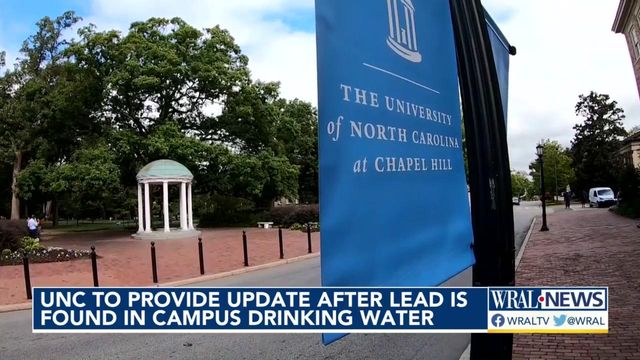Interns first discovered problem of lead in water on UNC campus
Two high school students participating in a summer internship are credited with setting in motion a series of tests that has identified lead in drinking water on the campus of the University of North Carolina at Chapel Hill.
The students, from Robeson County Early College, participated in a month-long internship at UNC this summer under the supervision of Dr. Drew Coleman.
Each year, students are invited to campus to learn about earth and environmental sciences.
The work of this year's cohort has far-reaching implications. They began with a plan to test water sources around the Chapel Hill campus.
UNC Vice Chancellor George Battle says it's unknown when the water fixtures were last tested because it's not required by law.
"There are no guidelines, no standards, and we don't have a record of it being tested previously," he said.
Dr. Michael Sandstrom, an earth science postdoctoral researcher, led the students in sampling water fixtures.
"Wilson and South buildings had very, very, extremely high levels that were very concerning," he said.
The university is using a phased approach, first testing the older buildings before moving on to newer ones.
"I saw the results, and I said, 'There's no way they can be this high,'" Coleman said.
Forty percent of the buildings tested so far have had detectable lead levels. So far, 44 buildings have been tested for lead, with 18 showing detectable levels.
As lead is found, the university is replacing fixtures. Once the initial round of tests is complete, the university will create a plan for continued testing.
"That will certainly be on the table as a lesson learned for us," Battle said.
Dr. Rebecca Fry, whose work focuses on understanding how exposure to toxins impacts human health, said, "We are not alone in this issue. What we are uncovering here, it likely exists in many other parts of the country."
Coleman also believes the issue could be far more widespread around the state.
"I hope that this is going to lead to a much broader testing scheme so we can find out where this is a problem," he said. "It's not just here at UNC, I'm sure."
Battle credits Coleman and his interns.
"We owe a big debt of gratitude to Professor Coleman," he said. "He led a summer internship, and they found lead through some testing in Wilson Library."
UNC is offering students and faculty who work or live in the buildings free testing for the presence of lead in the blood. So far, about 100 people have been tested, and all had levels in the normal range.











